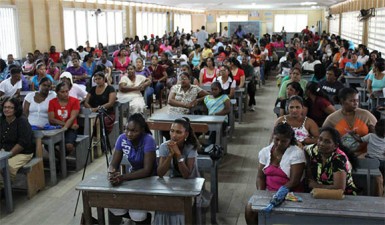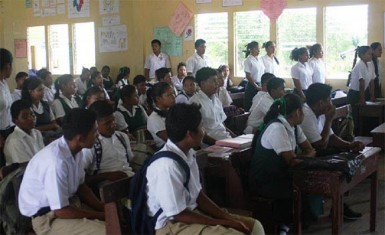The vast majority of parents send their children off to school every day hoping that they would do well though a smaller number actually address the formal education of their children from the standpoint of a carefully laid out plan designed to – as far as possible – ensure that they do well.
On the whole, a child’s success in school is a function of his or her own personal discipline and determination to do well. Innate ability and the learning environment in which the child functions.
Here, the term learning environment should not be taken to mean simply the formal school system. It extends to the home, even the community and the extent to which the environment outside the school is supportive of the academic goals of the child.

Parents and teachers generally exert by far the greatest influence on children’s lives, parents at home and teachers at school. It follows, therefore, that parents are ideally physically positioned to play an important role in the education of their children.
A modest survey undertaken among a limited number of teachers in various parts of coastal Guyana on the issue of the importance of parent/teacher teamwork to children’s education yielded some interesting outcomes. Of the 30 teachers interviewed (face to face and by telephone) all of them expressed the view that the academic fortunes of children are likely to be far more secure when parents and teachers work together as a team.
Interestingly, 13 out of the 30 teachers interviewed felt that an absence of effective parent/teacher teamwork was one of the single most important factors inhibiting the intellectual growth of children,
On the whole, while the outcomes of our study indicated that all parents hope that their children do well in school, most of them are either unaware of or ignore the fact that they can add what The Child Study Center in the USA describes as “an important extra ingredient that will boost their children’s success.” The Center goes on to assert that “parent participation is the ingredient that makes the difference. Parents’ active involvement with their child’s education at home and in school brings great rewards and can have a significant impact on their children’s child’s lives.”
Our enquiry amongst a smaller number (8) of local teachers revealed that children of involved parents are (1) absent from school less frequently (2) behave better in school (3) invariably submit homework and (4) consistently do better academically.

Research identified by this newspaper also indicates that a “home environment that encourages learning” is more important than parents income, education level or cultural background, though five out of the eight teachers in our latter set of interviews vehemently challenged this view. Indeed, their view was that children who come from “better homes” and whose parents are better-off financially and better-equipped intellectually, were likely to perform better in school. More than that, our eight respondents asserted that such parents were more amenable to teacher/parent ‘contracts.’
Our own reading of some of the literature on teacher/parent relationships suggests that some of the recommendations made to parents neglect to take particularly careful account of the social and economic setting. The Child Study Center, for example, asserts that “by actively participating in their child’s education at home and in school, parents send some critical messages to their child; they’re demonstrating their interest in his/her activities and reinforcing the idea that school is important.”
There is absolutely nothing wrong with this advice except of course that for the thousands of undereducated, low income single parents with children in school, “actively participating in their child’s education” is a ‘tough ask’ even with the best will in the world.
The reality is that some parents have both more time and more resources than others to become involved though one accepts as well that even the less well-positioned parents must continually examine their priorities in terms of supporting teachers. Simultaneously, one wonders whether the Ministry of Education is doing enough to strengthen the Parent/Teacher Association regime in ways that might better position parents to support teachers.
Even before we arrive at that juncture, however, our respondents make the point that the relationship between the school and the home is impacted negatively by poverty and its consequences. They make the point that those underfed and undernourished children who attend schools across the country are not likely to excel academically anyway. More than that, they point out the single, low-income parents with multiple school-age children are generally occupied with attending to their children’s physical basic needs so that education inevitably gets pushed down the scale of priorities. Indeed, these days, and regrettably so, far too many school-age children get pressed into service in various low level jobs in order to help put food on the table. As one of our teacher respondents put it “the absence of good teamwork between parents and teachers is, in many if not most cases, a reflection of wider societal failing. It has to do with the inability of the authorities to create the conditions in which parent/teacher relations can thrive.
One of the teachers with whom we spoke had an interesting story to tell. She is just over 40 years old, a single parent and a Senior Mistress at a Secondary School. She too, she says, experiences the preoccupations of a low-income parent whoi wants her children to do well but must divide her time between paying attention to their schoolwork and looking after their other needs. “The faqct that I sit on both sides of the fence, so to speak, puts me in a position to understand the problem. Sometimes the officials tend to talk through their hats because they only have access to one side of the fence.”
She accepts that “the system” is not doing enough to strengthen the local PTA mechanism but says that that shortcoming cannot be separated from the fact that, often, there are “compelling distractions that have to do with “parents means” that make it difficult to keep track of their children’s education. “As a parent tomorrow’s PTA meeting is far less important than today’s dinner and that is a reality,” our Senior Mistress respondent told the Guyana Review.
Some of the oft-repeated recommendations for more parental involvement with their children’s education include reading to children;. Discussing the books and stories that are read; helping children to organize their time; limiting television viewing on school nights; speaking with children regularly about school activity and checking homework every night.
Further recommendations include meeting with teachers in order to stay abrest of the school agenda, volunteer as classroom helpers and assist children with special needs.
The reality is (as several teachers popintws out to us) that an increasing number of parents are themselves ill-equipped – either in the context of their own academic credentials or their time to play the required roles. Indeed, what some teachers say they have discovered is that while many parents demonstrate an initial willingness to to be part of school PTA’s, some quietly disappear after a frew meetings having discovered that the responsibilities associated with the capacities in which they agreed to serve are beyond them. “Sometimes we forget about the security guards who work at night and about the growing number of sin gle-parent mothers, some of whom are only just out of school and without the kinds of qualifications that equip them to help their children, even in the most basic ways.”
While one expects that in adolescence, children become more independent and don’t necessarily want their parents as closely involved in their school lives, teachers continue to need the support. Secondary school children face challenges that often go beyond academic ones and, arguably, it is perhaps at this juncture that parent and teacher most need to work together. Parental involvement, although perhaps less direct, is still critical.
When questioned on this issue all of our latter eight (8) respondents expressed the view that children are likely to “grow away” from both parents and teachers, particularly during their senior secondary school years, “Of course we have the disciplined ones but the narrowing of the gap between adolescence and adulthood is a difficult period for the parents, the teachers and the children themselves to manage,” one teacher said.
It is the feeling of having ‘grown up’ without having had any real tuition in the responsibilities of adulthood that engenders a counterproductive sense of assertiveness in some teenagers. “The evidence in our schools today is that there is verbal and physical violence in schools that target teachers and fellow students, the emergence of school gangs and fourteen and fifteen year olds who become full-blown criminals. What is also interesting is that there are instances, many of them, in which parents appear to be supportive of their children’s dangerous behavior. When asked whether the education system had deviusded effective ways of addressing the problem of parent and child hostility towards teachers, all of the treachers that we interviuewed opined that the problem continued to be a serious one.
The consensus amongst the teachers whom we interviewed was that it is time to ‘get real’ on the issue of the parent/teacher compact. It makes no sense, they contend, to talk glibly about parents and teachers working together without coming to terms with the complications of making that teamwork a reality. Many of the barriers to effective communication between parent and teacher communication lie outside the control; of either the home or the school. They go to the very heart of the way in which our society is organized and the way we live. Pretending that we can fix the problem by putting together a handful of workshops and conferences from time to time will get us nowhere. Far more fundamental societal change is needed.





